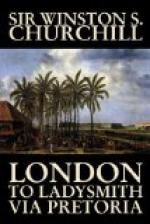On arrival, every officer was given a new suit of clothes, bedding, towels, and toilet necessaries, and the indispensable Mr, Boshof was prepared to add to this wardrobe whatever might be required on payment either in money or by a cheque on Messrs. Cox & Co., whose accommodating fame had spread even to this distant hostile town. I took an early opportunity to buy a suit of tweeds of a dark neutral colour, and as unlike the suits of clothes issued by the Government as possible. I would also have purchased a hat, but another officer told me that he had asked for one and had been refused. After all, what use could I find for a hat, when there were plenty of helmets to spare if I wanted to Walk in the courtyard? And yet my taste ran towards a slouch hat.
The case of the soldiers was less comfortable than ours. Their rations were very scanty: only one pound of bully beef once a week and two pounds of bread; the rest was made up with mealies, potatoes, and such-like—and not very much of them. Moreover, since they had no money of their own, and since prisoners of war received no pay, they were unable to buy even so much as a pound of tobacco. In consequence they complained a good deal, and were, I think, sufficiently discontented to require nothing but leading to make them rise against their guards.
The custody and regulating of the officers were entrusted to a board of management, four of whose members visited us frequently and listened to any complaints or requests. M. de Souza, the Secretary of War, was perhaps the most friendly and obliging of these, and I think we owed most of the indulgences to his representations. He was a far-seeing little man who had travelled to Europe, and had a very clear conception of the relative strengths of Britain and the Transvaal. He enjoyed a lucrative and influential position under the Government, and was therefore devoted to its interests, but he was nevertheless suspected by the Inner Ring of Hollanders and the Relations of the President of having some sympathy for the British. He had therefore to be very careful. Commandant Opperman, who was directly responsible for our safe custody, was in times of peace a Landrost or Justice. He was too fat to go and fight, but he was an honest and patriotic Boer, who would have gladly taken an active part in the war. He firmly believed that the Republics would win, and when, as sometimes happened, bad news reached Pretoria, Opperman looked a picture of misery, and would come to us and speak of his resolve to shoot his wife and children and perish in the defence of the capital. Dr. Gunning was an amiable little Hollander, fat, rubicund, and well educated. He was a keen politician, and much attached to the Boer Government, which paid him an excellent salary for looking after the State Museum. He had a wonderful collection of postage stamps, and was also engaged in forming a Zoological Garden. This last ambition had just before the war led him into most




